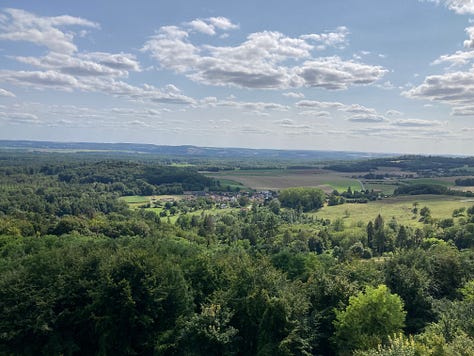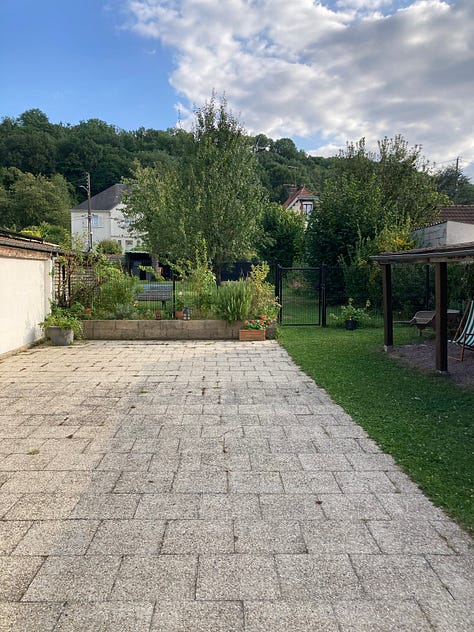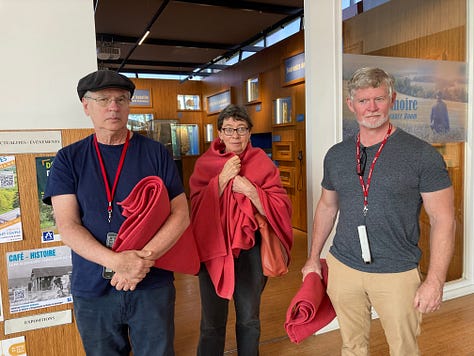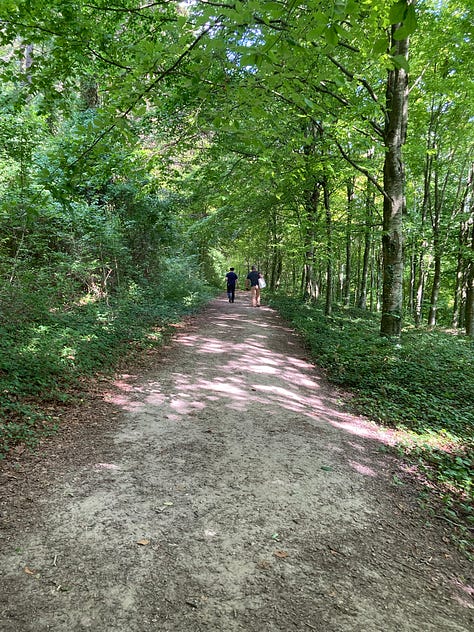Caverns of Despair
How I went to learn more about World War I and pondered End Stage Civilization

It’s another bright, cool day here in the northeast of France. Today we are traveling south through Reims to Langre to stay for two nights, before going on to Besançon and then to Geneva.
Yesterday we took a long tour through an enormous cave where the Germans entrenched themselves for almost two and a half years, before being pushed back by the French during World War I. We were guided through this cave by an exceedingly knowledgeable Frenchman in a brown corduroy suit with a pocket watch. Also in our small, cobbled-together group was a family with young children all of whom gradually melted away save for a small boy about ten years old and his father. These two doggedly stuck on to the end, and indeed lengthened the time of the tour by more than half because of asking so many interesting questions about the shape of helmets used by both the French and the Germans, the kind of guns, and, most pressingly, the facilities. That is, the Loo if you’re English, les Toilettes if you’re French, or the Restroom if you are American. Oh, said the guide in rapid French, there was a place where all the soldiers went, but it was utterly horrible. It could not really be dignified by a proper name. As a punishment for failure of duty or insubordination soldiers once or twice a month had to “treat” the place.
We stood before a tiny carved-out space where the German commander enjoyed the comforts of a small table and a bed made of wire elevated just slightly off the cold floor. Neither he nor anyone else was permitted a mattress because of mold and vermin. We passed on to the makeshift dormitory where fifty or sixty soldiers would have been crammed in together. They were forbidden from bathing or washing their uniforms because of the extreme damp and cold of the cave. All of them risked infection, this way, but not washing diminished the likelihood of the rapid spread of diseases like tuberculosis and many other bad illnesses that my French didn’t quite catch. I peered through the dim glass at another table covered in small medicine bottles and the uneven slope of the floor, happy, at least, that my French was as good as a ten-year-old’s and that I could basically understand the stream of information pouring forth from the guide.
In the cave was a makeshift hospital next to a spring that the Germans channeled through some rock and then treated with chlorine for the healing of the wounded. The water wasn’t potable but better than nothing against the cuts and injuries from the thousands of miles of barbed wire strung all over the trenches. Antibiotics, tragically, wouldn’t appear for another few years.
There was also a chapel where, the guide observed rather sardonically, the soldiers went to pray that they wouldn’t die. Next to it was a cemetery, right there underground.
The hellish stench of the cave lingered years into the future, long past the war. But at least those in the cave weren’t in the trenches where soldiers waiting for the next offensive endured unendurable boredom and anxiety. The cave was called La Caverne du Dragon. This name came about because the Germans found a way to vent smoke from the kitchens they cobbled together which allowed them to feed their soldiers a hot meal every day.
And as I stumbled over the uneven terrain of that dark, cold memorial to young men doomed to suffering and death, though some to honor and glory, I couldn’t help but remember a post—which I can’t possibly find now—about what to do if you feel down because of the disapprobation of other people. Perhaps someone has been unkind to you, the advice giver said, and you are despondent and depressed. What can you do to take care of yourself in situations like that? It is, most of all, important to be good to yourself, to maintain your mental and spiritual health. As you’re reeling from the bad interaction, take a hot bath and let the world melt away. Spend some time journalling. Seek out a friend who will help you dispassionately reflect on the interaction. Take a walk to recenter yourself. Finally, think about whether you even need that person in your life. Because, as everyone like Joel Osteen and Rachel Hollis are quick to warn, who you spend time with is going to be who you become. Be careful about your associations and friendships. On the upward journey to realize your potential and be all you can be, critical people who don’t understand your goals and gifts can drag you down.
I also reflected to myself that I am a member of that uncomfortable demographic—une femme un certain âge—that, lately, seems characterized by increasing anxiety and even despair. I suppose almost everyone feels a certain modicum of that wretched emotion these days. Young men are committing suicide at horrific rates. Gen Zers don’t expect much from the future. And surely, if one is looking for a sign of hopelessness, all one need do is glance at the plunging birthrates. How is it possible, I asked myself, that we enjoy such unprecedented levels of material comfort—hot and cold water by the flick of the wrist, cloud-like duvets to protect against the night chill, Dansco shoes, a personal pocket computer—and yet be so anxious?
I suppose the answer is many-layered, but the kernel of it might be found in the ironic smile of the French guide feeling sorry for all those soldiers who, in the darkness of the cave in the depths of the earth, who had no material comfort and even less hope to survive the night, yet knelt in desperation in that small chapel to beg God for mercy. Look, said the guide, how it didn’t work. They all died, though not all in the cave.
So also will we die. Every single person will die, will be torn out of the degradations and comforts of this life one way or another. And the worst of it is, no person can control the circumstances that will affect that death. The assassination of Archduke Ferdinand and his wife hundreds of miles away from la Caverne du Dragon set in motion a series of events that culminated in young men digging into the earth itself, learning to throw grenades, shouldering long bayonetted guns, enduring the horrors of a war that, for them, had to be the very last of all wars.
Do I, who can control the flow of water in this Airbnb with absolutely no trouble to myself have any more control over the world or my own fate than they did? Of course not. In this, I do well to be anxious, to fret, to worry over suffering—my own and everyone else’s. I am not wrong to look at the evils of my own day and lament them.
And yet, because those soldiers lived in the fading twilight of a world that still possessed the memory of God, and prayed to him for the salvation of their souls, a prayer God never turns away from, I and every single middle-aged rich woman in the West am almost to be more pitied than they. For I am taught that God has nothing to say about my circumstances, that prayer is as useful as mere “thoughts,” that suffering has no purpose, that suffering can be solved by yet more technology, that I have to find and make my own meaning in life, that the children of my body aren’t given as gifts from God but are a matter of mere human “choice,” that God, who does not even exist, is probably not good and can yet be blamed for the systemic troubles we create for ourselves. For the person alive today—whatever kind of person it might be—the solid rock of a coherent, divinely ordered cosmos has been shaken to its core, a shaking that began with that awful, awful war. And in the face of this catastrophe, instead of being told to rush to Jesus, to Church, to the Rock that is higher than this dim cave of existential and spiritual crisis, the “experts” of the day think the best remedy is a bubble bath, the continued severing of the tenuous connections we have with each other, and worst of all, the erasure of the Lord Christ from every space and every heart.
So anyway, have a nice day! I’m off to see where Charlamagne did so many interesting things.










So true, Anne. Sad and true.
Love this, so glad I found your writings!